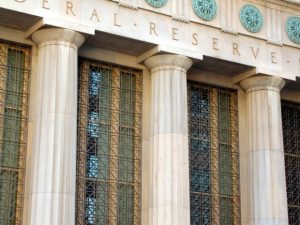by Franklin Templeton Investments blog, Franklin Templeton Investments
Last week’s equity market performance was somewhat lackluster. The extreme rotation we saw the previous week eased off. Focus was on central banks amid a number of monetary policy meetings. Notably, the US Federal Reserve (US Fed) cut interest rates by 25 basis points (bps), as expected.1 Interestingly, however, the views of the Fed members regarding the future path of rates were mixed.
The Digest
Central Banks in Focus

Last week the US Fed, Bank of England (BoE), Bank of Japan (BoJ), Swiss Central Bank (SNB) and Norges Bank all unveiled interest-rate decisions. The Fed decision dominated attention, with the other central bank meetings largely passing off as expected.
US Fed: On Wednesday, the Fed cut its main refinancing rate by 25 bps, to a new range of 1.75% – 2%. The move was in line with market expectations. Fed Chairman Jerome Powell stated: “We took this step to help keep the US economy strong in the face of some notable developments and to provide insurance against ongoing risks.”
As at the July meeting, Powell said uncertainties about outlook remain. He added the Federal Open Market Committee (FOMC) would “continue to monitor the implications” and would “act as appropriate.” This essentially leaves the door open for further easing, in our view.
Looking to the dot plot—the expected path of interest rates—we see some divergence among the views of Fed members.
The median projection for the benchmark interest rate for 2019 fell 50 bps to 1.875%, indicating no further rate cuts this year. However, seven participants projected one further cut this year and five were opposed to last week’s easing. The 2020 median projection was also 1.875%, indicating no additional easing next year.
The equity market reaction was interesting, in our view. Markets initially fell on the headlines, but then rallied during Powell’s press conference as he commented the Fed might need “to resume organic growth of the balance sheet”. He said he was open to a “more extensive sequence of cuts” if needed. The Fed funds futures see a 49% chance of a 25 bps cut in October, and a 72% chance of a hike by the November meeting.2
Ultimately, the decision was broadly in-line with expectations, and we think Powell has left himself options for further easing should he need it in the future. The rate cut was largely priced in, based on the muted weekly equity market performance. There were not too many fireworks (aside from a critical tweet from US President Donald Trump).
BoJ: Elsewhere, the BoJ continued its dovish narrative. Japan’s central bank kept Japanese interest rates on hold at -0.1% as expected, and left forward guidance for policy rate unchanged.
BoE: The BoE seems to be keeping its powder dry until it has better visibility on the Brexit outcome. Interest rates remained on hold at 0.75% with a unanimous committee vote. Monetary policy committee members predicted that if Brexit uncertainty persists, inflation will likely be weaker.
Others: The SNB also kept rates on hold at -0.75%. Norway was the lone hiker, as the Norges Bank raised its interest rate to 1.5% as expected.
Finally, as a reminder of the challenges facing central banks, on Thursday the Organization for Economic Co-operation and Development (OECD) cut its 2019 global growth forecast to 2.9% from 3.2%, with outlook “increasingly fragile and uncertain” in the context of trade tensions.
Brexit Update
 Sentiment improved towards the end of last week following comments from European Commission President Jean-Claude Juncker, who said he was doing “everything” he could to prevent a no-deal Brexit. He added he believed a deal could be reached.
Sentiment improved towards the end of last week following comments from European Commission President Jean-Claude Juncker, who said he was doing “everything” he could to prevent a no-deal Brexit. He added he believed a deal could be reached.
Juncker indicated that he is not tied to the Northern Irish backstop if a credible alternative was put forward by the UK. It’s important to note nothing has fundamentally changed, with no reports of any progress in negotiations. There is also a question over whether legal preparations for a deal could be met before the October 31 deadline.
Still, investors seem to have taken the comments well, with sterling rallying on Friday.
It looks to be a busy week ahead on the UK political front. The opposition Labour Party is holding its annual conference this week with decisions on its Brexit policy high on the agenda. In addition, we expect the UK’s Supreme Court to rule on Tuesday whether Prime Minister Boris Johnson’s decision to suspend Parliament was lawful.
Crude Oil Volatility
 It proved to be a very volatile week for oil prices and energy stocks after the drone attack on a Saudi Arabian oil refinery the previous weekend. The attack on the world’s second largest oil producer saw Brent crude oil prices post their largest ever intraday increase during Asian trading last Monday, up 20% at one point.
It proved to be a very volatile week for oil prices and energy stocks after the drone attack on a Saudi Arabian oil refinery the previous weekend. The attack on the world’s second largest oil producer saw Brent crude oil prices post their largest ever intraday increase during Asian trading last Monday, up 20% at one point.
These events are a reminder how quickly things can change in the oil market. On Tuesday, the Saudi authorities appeared to paint a positive picture (in relative terms) around the timescale of getting the Abqaiq refinery fully back online. They said that they had managed to restore almost half of the output lost, and predicted production would return to pre-attack levels by the end of the month.
While that quelled some fears, investors remain downbeat on the clean-up and the true impact of this incident. Over the weekend, media reports suggested disruption might last up to eight months.
These attacks also raise questions about geopolitical risks in the region.
Any escalation of tensions in the region could increase the likelihood of outages. Should that occur, global reserves may become very limited and inventory draws could be much larger. For now, both the International Energy Agency (IEA) and President Trump have said they do not see the need to release strategic oil reserves. Further sanctions from the United States on Iran are possible.
We are in “wait-and-see” mode with regards to the oil market, and this week has the potential to deliver some further market-moving events in the aftermath of what was a very volatile week for the space.
Last Week
Europe
European equities enjoyed their fifth straight week of gains. The strength was more muted than previous weeks, but volumes were elevated. The rotation out of momentum and into value stocks that we had seen in the prior week paused for breath. Cyclicals—such as basic resources, autos and industrials—underperformed, while defensives, such as real estate and health care, outperformed.
Oil and gas names were the week’s clear winners, however, driven by unfolding geopolitical events. Italian bonds widened and Italian shares underperformed as the prospect of further political instability rose after former Italian Prime Minister Matteo Renzi broke away from the Democratic Party.
Following the European Central Bank (ECB) meeting last week and ECB President Mario Draghi’s push for fiscal stimulus, we started to see signs that individual governments had taken note. Sweden is now looking to expand its budget by SEK30 billion, the Dutch government launched a €50 billion national investment fund, and Germany pledged €54 billion to tackle climate change.
Americas
US equities underperformed their European counterparts, with all major US indices softer last week. The FOMC meeting was the main focus. The pause of the rotation dynamic was also evident as defensives outperformed and cyclicals struggled. Mirroring what we saw in Europe, energy names were the week’s stronger performers after the Saudi oil facility attack.
Trade generated headlines. Expectations for a US/China deal any time soon remain low despite talks continuing in Washington.
US Trade Representative Robert Lighthizer said there had been movement on several issues but stressed that it was “an extraordinary challenge” to get a complete deal.
Donald Trump also tempered expectations, saying agriculture purchases would not be enough to reach a deal. He reiterated he wants a complete deal with China, not a partial one. Following this, China’s trade delegation cancelled its scheduled tour of US farms, implying sentiment had cooled.
Another widely discussed theme was US dollar funding pressure. The cost of borrowing US dollar cash versus US Treasuries overnight via repurchasing agreements (repos) spiked on Tuesday morning as demand increased, leading to liquidity shortages.
Repos are key to the US financial system as they give companies access to cash overnight, using US Treasuries as collateral.
There has been additional stress for the system in recent days with companies using the mechanism to pull cash in order to pay tax bills. Lenders’ reserves have also been declining since the Fed pulled its bond-buying programme in 2014, which reduces the amount of cash it is willing to lend through repo operations.
High funding costs are a concern as they imply a sharp tightening of financial conditions, which in turn is negative for the value names within equities. This may have played into that pause of the rotation dynamic last week, but the impact on markets was dampened as the Fed announced several operations to bring the level back in line with targets.
Asia
Asian equities were mixed last week with country-specific headlines driving moves. Hong Kong was the key underperformer amid continuing protests.
Onshore Chinese equities were also weaker last week, with trade headlines remaining in focus. China will be closed from October 1 to 7 to celebrate the 70th anniversary of the founding of the People’s Republic.
Equities were better off in Japan after Trump announced the United States had signed an initial trade agreement.
Also, as expected, the BoJ left rates unchanged and policy settings unchanged while noting rising risks from overseas. It also reiterated the inflation target of 2% remains a key focus as it continues to monitor progress towards that goal.
South Korean equities likewise were solid performers in the region. Meanwhile, Australian equities were also stronger with energy stocks supporting the advance.
Week Ahead
Politics
The United Nation General Assembly meeting will be a focus at the start of the week. We will be watching for commentary around the tension in the Middle East. In addition, UK Prime Minister Boris Johnson is attending, so we may see some Brexit headlines.
Macro
- Tuesday: US: (Sep) Consumer Confidence, (Jul) Federal Housing Finance Agency (FHFA) House Price, (Sep) Richmond Fed Manufacturing Index; France: (Sep) Business and manufacturing confidence data
- Wednesday: US: (Aug) New home sales;
- Thursday: US Second-quarter gross domestic product and core personal consumption expenditures (PCE); Initial Jobless Claims;
- Friday: US: (Aug) PCE deflator, durable goods; (Sep,) China: (Aug) Industrial Profits;
Central Banks
It should be a quiet week after a flurry of interest-rate decisions last week. A number of ECB and Fed officials have speaking engagements, however.
Views You Can Use
Insight from Our Investment Professionals
The Fed Calls Time for a Reality Check
The US Federal Reserve cut its benchmark short-term interest rate for the second time this year, but some observers were disappointed the Fed didn’t more strongly signal future easing moves. Franklin Templeton Fixed Income CIO Sonal Desai shares her thoughts on why the central bank needed to rein in expectations a bit. Read More.
How ETFs Can Help Address Changing Client Expectations
Across Europe, we’re seeing evidence that exchange-traded funds are playing a more prominent role in investors’ portfolios. However, Jason Xavier, Head of EMEA ETF Capital Markets at Franklin Templeton, still encounters advisers who remain unconvinced of the merits of ETFs. In this article, he argues that ETFs have a central role to play for the investors of tomorrow. Read More.
August Ruled by Economic Slowdown and Trade Fears
Trade fears, social unrest in Hong Kong and Brexit uncertainties weighed on markets in August. Franklin Templeton Emerging Markets Equity expects continued volatility, but an interest-rate cut from the US central bank in September could help stabilize emerging market currencies. The team shares its latest outlook. Read More.
People in Hong Kong and mainland China aren’t saving enough for retirement, running the risk of outliving assets during their golden years, according to Franklin Templeton’s 2019 Retirement Income Strategies and Expectations (RISE) survey. Even so, most survey respondents are aware of their retirement funding options and are comfortable with what they mean. Alan Young, head of institutional businesses, Greater China, and Stephen Tong, portfolio manager, Franklin Templeton Multi-Asset Solutions, look at how some savers are missing out on potential opportunities. Read More.
European Political Developments: A Lesson in Unexpected Consequences
Even the most dedicated news-junkie may struggle to keep up with the pace of political shenanigans in Europe in recent weeks. Two countries in which the news has been especially fast-moving are Italy and the United Kingdom. Our Head of European Fixed Income David Zahn notes some peculiar similarities in the way events have unfolded. Read More.
Pinpointing Fixed Income Credit Risks
In this excerpt from the latest Franklin Templeton Thinks, Franklin Templeton Fixed Income Group examines how machine learning techniques can measure the risks of consumer and home loans—helping pinpoint credit risks they think are worth taking. They review digital loans, a relatively new asset class, and explain why quantitative approaches may be more applicable to some fixed income sectors than others. Read More.
For timely investing tidbits, follow us on Twitter @FTI_Global and on LinkedIn.
Important Legal Information
This article reflects the analysis and opinions of Franklin Templeton’s European Trading Desk as of 23 September 2019, and may vary from the analysis and opinions of other investment teams, platforms, portfolio managers or strategies at Franklin Templeton. Because market and economic conditions are often subject to rapid change, the analysis and opinions provided may change without notice. An assessment of a particular country, market, region, security, investment or strategy is not intended as an investment recommendation, nor does it constitute investment advice. Statements of fact are from sources considered reliable, but no representation or warranty is made as to their completeness or accuracy. This article does not provide a complete analysis of every material fact regarding any country, region, market, industry or security.
Nothing in this document may be relied upon as investment advice or an investment recommendation.The companies named herein are used solely for illustrative purposes; any investment may or may not be currently held by any portfolio advised by Franklin Templeton.
Data from third-party sources may have been used in the preparation of this material and Franklin Templeton (“FT”) has not independently verified, validated or audited such data. FT accepts no liability whatsoever for any loss arising from use of this information and reliance upon the comments, opinions and analyses in the material is at the sole discretion of the user. Products, services and information may not be available in all jurisdictions and are offered by FT affiliates and/or their distributors as local laws and regulations permit. Please consult your own professional adviser for further information on availability of products and services in your jurisdiction.
What Are the Risks?
All investments involve risk, including possible loss of principal. The value of investments can go down as well as up, and investors may not get back the full amount invested. Stock prices fluctuate, sometimes rapidly and dramatically, due to factors affecting individual companies, particular industries or sectors, or general market conditions. Bond prices generally move in the opposite direction of interest rates. Thus, as prices of bonds in an investment portfolio adjust to a rise in interest rates, the value of the portfolio may decline. Investments in foreign securities involve special risks including currency fluctuations, economic instability and political developments. Investments in developing markets involve heightened risks related to the same factors, in addition to those associated with their relatively small size and lesser liquidity.
Past performance is not an indicator or guarantee of future performance.
Links to External Sites
Franklin Templeton Investments is not responsible for the content of external websites.
The inclusion of a link to an external website should not be understood to be an endorsement of that website or the site’s owners (or their products/services).
Links can take you to third-party sites/media with information and services not reviewed or endorsed by us. We urge you to review the privacy, security, terms of use, and other policies of each site you visit as we have no control over, and assume no responsibility or liability for them.
1. A basis point is a unit of measurement. One basis point is equal to 0.01%.
2. Source: CME Group. There is no assurance that any estimate, forecast or projection will be realised.
This post was first published at the official blog of Franklin Templeton Investments.













